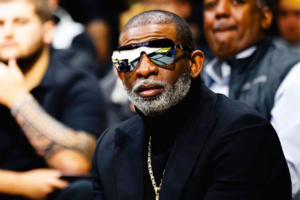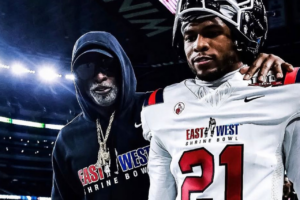In the pristine mountain air of Boulder, Colorado, Deion Sanders’ coaching philosophy emerges as something far more profound than X’s and O’s sketched on a whiteboard. It’s an intricate tapestry woven from old-school discipline, spiritual guidance, and an unwavering commitment to character development that extends well beyond the chalk lines of the football field.
“The game gonna give you what you give it,” Sanders reflects, his voice carrying the weight of decades of experience. His approach to coaching resembles less a transaction and more a relationship—one that demands devotion, authenticity, and an understanding that success isn’t measured solely by the scoreboard. This philosophy manifests each morning as Sanders stands before his team, delivering messages that transcend football strategy, speaking directly to the heart of character development and personal growth.
The foundation of his leadership style rests on what he calls “smart, tough, fast, disciplined with character”—five pillars that echo through every aspect of his program. It’s a methodology that draws from an impressive lineage of mentors, including Bobby Bowden and Mickey Andrews, yet remains uniquely his own. “I’m a mixture of all these young men that were old school,” Sanders explains, but his approach is far from merely retrospective. Instead, it’s a careful balance of timeless principles and modern innovation.

Perhaps most striking is Sanders’ insistence on maintaining clear boundaries while fostering deep connections. When his players cross the white lines of the practice field, he’s “Coach,” not “Dad”—even to his own sons. This distinction creates a professional framework where expectations are unambiguous and standards remain consistently high for everyone. “I’m not going to promise you nothing,” he says of his recruiting philosophy, emphasizing that everything must be earned, never given.
But beneath this structured exterior lies a profound understanding of his broader mission. Sanders recognizes that for 95% of his players, professional football isn’t in their future. Therefore, his morning messages and private meetings focus heavily on preparing young men for life beyond the game—developing future fathers, political figures, doctors, and community leaders. This holistic approach to development explains why he eschews traditional team captain roles in favor of identifying and nurturing leaders, understanding that “every dog ain’t a leader, every leader ain’t a dog.”
The results of this philosophy speak volumes. At Jackson State, Sanders transformed not just a football program but an entire culture, bringing national attention and corporate partnerships to an HBCU institution while maintaining academic standards and personal development as paramount priorities. His ability to balance high expectations with genuine care for his players’ wellbeing creates an environment where young athletes can thrive both on and off the field.
In essence, Sanders’ coaching philosophy represents a masterclass in leadership—one that understands that true success isn’t measured in wins and losses alone, but in the character and capability of the men who emerge from his program. It’s a philosophy that treats football not as the end goal, but as the vehicle through which young men can discover their potential and prepare for life’s greater challenges.
When Deion Sanders arrived at Jackson State University in 2020, he brought more than just his legendary name—he carried a vision that would transform not just a football program, but the entire landscape of HBCU athletics. The story that unfolded over three remarkable years stands as a testament to what’s possible when ambition meets opportunity, and tradition meets innovation.
From the outset, Sanders approached the role with characteristic boldness, implementing professional standards that would elevate Jackson State above typical HBCU expectations. Under his leadership, the program underwent a metamorphosis that touched every aspect of its operation. Gone were the days of mismatched uniforms and inconsistent team appearances; in their place emerged a program that rivaled Power Five schools in its presentation and professionalism. Players arrived at away games in coordinated attire, a visual representation of the program’s renewed commitment to excellence.

The transformation extended far beyond aesthetics. Sanders leveraged his personal brand and connections to forge unprecedented corporate partnerships, bringing resources to Jackson State that had previously seemed unattainable. Walmart, American Airlines, Procter & Gamble, and Under Armour became more than just sponsors—they became partners in a movement to elevate HBCU football. These relationships resulted in facility improvements, enhanced travel arrangements, and most importantly, increased visibility for the program and its players.
Perhaps the most striking achievement was Sanders’ ability to attract national attention to HBCU football. When College GameDay made its historic visit to Jackson State, it wasn’t just a television event—it was a statement about the changing perception of HBCU athletics. The program’s games became must-watch events, with NFL scouts regularly attending practices and games, creating legitimate professional opportunities for players who might have otherwise been overlooked.
But Sanders’ impact wasn’t limited to the field. He instituted academic standards and personal development programs that emphasized the “student” in student-athlete. His approach to building young men, not just football players, resonated throughout the campus and community. The result was a program that won not just games—though they did plenty of that, securing consecutive SWAC championships—but also victories in graduation rates and career preparation.
The criticism of Sanders’ departure for Colorado reveals, perhaps inadvertently, the magnitude of his success at Jackson State. He had created something so valuable that its potential loss was felt deeply by the community. Yet, he left behind more than memories—he left a blueprint for success, complete with upgraded facilities, established corporate relationships, and a renewed sense of what’s possible in HBCU athletics.
His legacy at Jackson State will be measured not just in wins and losses, but in the doors he opened and the standards he established. He proved that HBCU football could command national attention, attract top talent, and operate with professional standards while maintaining its rich cultural traditions. More importantly, he demonstrated that with the right vision and leadership, any program could transform itself from an underdog into a powerhouse, creating opportunities that extend far beyond the football field.
In the crisp mountain air of Boulder, Colorado, a revolution is brewing. Deion Sanders stands in his new office at the University of Colorado, gazing out at the Flatirons, his reflection mingling with the majestic backdrop in the window pane. For him, this scenic vista represents more than just a change of scenery—it embodies the canvas upon which he plans to paint his masterpiece of collegiate football transformation.
Sanders’ vision for Colorado football is both audacious and methodical, built upon the foundation of what he calls “smart, tough, fast, disciplined with character.” These aren’t just buzzwords thrown around in recruiting pitches; they represent the cornerstone principles of a program reimagining itself. When he arrived, Sanders made headlines with his direct approach, telling some players they might want to enter the transfer portal because the standard was about to change dramatically. It wasn’t showmanship—it was a clear declaration of intent.

The assembly of his coaching staff reflects this commitment to excellence while breaking traditional molds. Sanders has built one of the most diverse coaching staffs in Power Five football, bringing in experienced minds like Dennis Thurman and others who understand both the X’s and O’s of football and the nuances of developing young men. This staff composition isn’t just about representation—it’s about providing players with mentors who can relate to their experiences while pushing them toward their potential.
“Rick George made me feel comfortable,” Sanders reflects on his decision to come to Colorado. “He made me feel like we were going to do this together.” This collaborative approach extends beyond the athletic department and into every facet of the program. Sanders envisions a holistic development system where athletic excellence is just one component of a larger success story. His program focuses on building complete student-athletes who are prepared for success whether their future lies in the NFL or the boardroom.
The transformation begins with recruiting, where Sanders has already demonstrated his ability to attract top talent. But unlike traditional recruiting pitches that focus solely on facilities or playing time, Sanders’ approach centers on personal development and authentic relationships. “I’m not going to promise you nothing,” he states firmly. “You have to come here and earn every darn thing you get.”
This straight-shooting philosophy extends to his vision for game days at Folsom Field. Sanders can already envision the stadium packed with passionate fans, the energy electric, as his team showcases the brand of football he’s implementing. It’s a vision of not just winning games, but doing so with style, substance, and an unwavering commitment to excellence.
What makes Sanders’ vision particularly compelling is its comprehensive nature. He’s not just focused on winning football games—though that’s certainly a priority. He’s focused on creating a program that transforms young athletes into successful men, that turns potential into performance, and that establishes Colorado as a destination for players serious about both athletic and personal development.
As Boulder embraces its new era of football under Coach Prime, the message is clear: this isn’t just about returning Colorado to its former glory—it’s about creating something entirely new, a program that sets the standard for what college football can be in the modern era. With every decision, every recruit, and every practice, Sanders is laying the foundation for a transformation that could redefine college football in the Rocky Mountains and beyond.
In the world of college football, where the line between tradition and innovation often blurs, Deion Sanders has crafted a leadership philosophy that transcends conventional coaching wisdom. His approach, a masterful fusion of old-school discipline and contemporary player development, offers a compelling blueprint for leadership that extends far beyond the confines of the gridiron.
Central to Sanders’ methodology is the understanding that building winners requires more than just X’s and O’s. Each morning begins not with playbooks, but with messages that speak to the soul of his program. “The game gonna give you what you give it,” he often tells his players, treating football not as a mere sport, but as a metaphor for life’s greater challenges. These daily gatherings serve as more than motivational sessions—they’re foundational moments where character is shaped and values are instilled.

The influence of his mentors—Bobby Bowden, Mickey Andrews, Dave Cable—echoes through his coaching style, yet Sanders has crafted something uniquely his own. He describes himself as “a mixture of all these young men that were old school,” but his approach is anything but dated. Instead, it’s a carefully calibrated blend of timeless principles and modern sensibilities, where discipline meets understanding, and authority meets empathy.
Professional standards permeate every aspect of his program, from the way players dress to how they conduct themselves off the field. “I don’t play that,” Sanders asserts when discussing compromising these standards. Yet within this framework of high expectations, he builds profound personal connections with his players. It’s a delicate balance—maintaining authority while fostering genuine relationships—that few coaches master.
Perhaps most striking is Sanders’ emphasis on preparation and accountability. In his program, nothing is given; everything must be earned. This philosophy extends from playing time to personal development, creating an environment where success is measured not just in victories, but in the growth of character. “We don’t promise things,” he states firmly. “You got to earn every darn thing you get.”
The spiritual component of Sanders’ leadership style sets him apart in modern college football. Each day begins with prayer and reflection, establishing a foundation of purpose that transcends football. This holistic approach acknowledges that while not every player will reach the NFL, each has the potential to become a leader in their community, a successful professional, or a positive force for change.
His method of developing leaders rather than merely appointing team captains illustrates the sophistication of his approach. “Every dog ain’t a leader, every leader ain’t a dog,” he explains, recognizing that leadership manifests in various forms and must be cultivated rather than simply designated.
The results speak volumes. Whether at Jackson State or now at Colorado, Sanders’ philosophy creates environments where young men thrive not just as athletes, but as individuals. His program becomes a crucible where character is forged, standards are elevated, and future leaders emerge.
In essence, Sanders’ coaching philosophy represents a masterclass in modern leadership—one that understands that true success isn’t measured solely by victories on the field, but by the character and capability of the men who emerge from his program. It’s a testament to the power of combining unwavering standards with genuine care, creating a legacy that extends far beyond the final whistle.
Based on the script, I’ll write about one of the major themes. I’ll choose the heading:
In the rarefied air of college football, where familial bonds and professional obligations often create complex dynamics, Deion Sanders has crafted a masterclass in balancing the delicate roles of father and coach. His relationship with his sons, Shedeur and Shilo Sanders, offers a compelling case study in maintaining professional standards while nurturing family ties within the pressure cooker of elite athletics.
At the heart of Sanders’ approach lies a stark delineation between personal and professional relationships. “When they cross that line, I’m coach,” he explains with characteristic directness. “I’m not Dad.” This boundary, seemingly rigid on the surface, actually creates a framework of clarity that allows both roles to flourish independently. On the field, there’s no room for familial favoritism—every position, every opportunity must be earned, not inherited.
The journey began long before the bright lights of college football. Sanders started coaching Shedeur at age five, establishing early the dual-relationship dynamic that would define their football journey. Through youth leagues and high school, he carefully cultivated his son’s quarterback abilities, all while maintaining the delicate balance between paternal guidance and coaching authority. The results speak for themselves—Shedeur developed into a highly recruited prospect with a singular mission: to play at the level his father once dominated.

What makes this family dynamic particularly fascinating is its extension beyond just father and sons. The Sanders family’s involvement in their programs runs deep, from social media management to team operations. It’s a true family enterprise, yet one that maintains professional standards throughout. “Who’s all in?” Sanders often asks, pointing out that his commitment to program building includes bringing his entire family into the fold.
Perhaps most remarkable is how Sanders handles the inevitable scrutiny that comes with coaching his sons at the collegiate level. When accusations of nepotism arose, his response was characteristically straightforward: “Put on the film and watch.” This confidence stems from establishing clear metrics for success and holding his sons to the same—if not higher—standards than their teammates.
The template Sanders has created for managing family relationships within a football program could serve as a blueprint for others facing similar challenges. His approach demonstrates that with clear boundaries, consistent standards, and unwavering professionalism, family ties can actually strengthen rather than compromise a program’s integrity.
As the Sanders family dynasty continues to evolve at Colorado, their story offers valuable lessons about the power of maintaining professional standards while honoring family bonds. It’s a delicate balance, but one that, when struck correctly, can create something truly special in college football—a family legacy built on merit, not merely name.
In the gleaming facilities of modern college football, where the spotlight often focuses solely on athletic achievement, Deion Sanders has architected a philosophy that extends far beyond the end zone. His vision for player development acknowledges a stark reality that many coaches prefer to sidestep: only 5% of college athletes will ever play professional football. It’s this understanding that shapes his revolutionary approach to building not just better players, but better men.
“Ninety-five percent of these young men that come through these doors are not going to be professional football players,” Sanders states with characteristic directness. This isn’t a limitation in his eyes—it’s an opportunity to focus on what he considers the true mission of college athletics: preparing young men for life’s bigger game. His program becomes a laboratory for leadership, where football serves as the vehicle rather than the destination.
The methodology is both sophisticated and practical. Morning meetings, far from being simple X’s and O’s sessions, transform into forums for character development. Sanders delivers messages that speak to the soul of what it means to be a successful man in modern society. These daily gatherings become touchstones for personal growth, where future fathers, business leaders, and community pillars begin to see themselves as more than just athletes.
Perhaps most innovative is Sanders’ approach to leadership development. Rejecting the traditional concept of team captains, he instead focuses on identifying and nurturing leaders in various capacities. “Every dog ain’t a leader, every leader ain’t a dog,” he explains, acknowledging that leadership manifests in different ways. This nuanced understanding creates multiple pathways for players to develop their voices and influence within the program.
The professional development aspect of Sanders’ program is equally comprehensive. Players receive guidance on everything from financial literacy to personal branding. When social media influencer Brittany Renner spoke to his team about the pitfalls of fame and fortune, it wasn’t just about cautionary tales—it was about understanding the business of being a public figure in the modern era. “I might be about 15 million dollars more,” Sanders reflects, emphasizing the practical value of such real-world education.
What sets Sanders’ approach apart is its authenticity. He’s not merely preaching success principles—he’s sharing hard-earned wisdom from his own journey from athlete to icon to educator. His program becomes a finishing school of sorts, where young men learn to navigate everything from corporate partnerships to community leadership, all while maintaining their athletic commitments.
The impact of this holistic development approach extends far beyond graduation day. Sanders’ alumni don’t just enter the world with a degree and game film—they emerge with a toolkit for success in whatever arena they choose to enter. Whether they’re headed to NFL training camps or corporate boardrooms, they carry with them lessons in leadership, character, and professional excellence that transcend sport.
In essence, Sanders has created more than a football program; he’s established an academy for life success where football serves as the classroom but not the curriculum. His legacy won’t just be measured in wins and losses or even in the number of players who make it to the NFL—it will be counted in the generations of leaders, professionals, and community builders who trace their success back to the lessons learned under his tutelage.
In the rapidly evolving landscape of college football, where tradition meets transformation, Deion Sanders stands as both architect and provocateur of change. His vision for the future of the sport extends far beyond conventional boundaries, challenging long-held assumptions about program building, player development, and the very essence of collegiate athletics.
At the heart of Sanders’ forward-thinking approach lies a sophisticated understanding of Name, Image, and Likeness (NIL) opportunities. Yet his perspective differs markedly from the transactional view many have adopted. “You ain’t done nothing to earn that gift,” he tells his players, emphasizing the importance of building genuine value before seeking compensation. His program doesn’t just help players navigate NIL opportunities—it teaches them to become worthy of them.
The revolution in recruiting strategy under Sanders’ leadership demonstrates the power of authenticity in the modern era. “I am who I am,” he states, eschewing the traditional sales pitches that have long dominated college football recruiting. Instead, he offers something more valuable: a proven pathway to personal and professional development. His success in attracting top talent, including five-star recruits like Travis Hunter to Jackson State, proves the effectiveness of this approach.
Perhaps most significant is Sanders’ impact on diversity within college football’s coaching ranks. His staff composition at Colorado reflects a deliberate effort to create opportunities for minority coaches and administrators, not merely as a gesture toward inclusion, but as a strategy for building a more dynamic and effective program. This approach has created a blueprint for other programs to follow, demonstrating that diversity and excellence are inextricably linked.
The standards of program excellence are being redefined under Sanders’ leadership. Traditional metrics of success—wins and losses, recruitment rankings, and attendance figures—remain important, but they’re now part of a broader matrix that includes academic achievement, character development, and community impact. This holistic approach to program building represents a paradigm shift in how success is measured in college football.
Modern program building, in Sanders’ view, requires a sophisticated understanding of social media, personal branding, and professional development. His programs don’t just acknowledge these aspects of modern athletics—they embrace them as essential components of player development. The integration of influencers like Brittany Renner to speak about personal brand management demonstrates this forward-thinking approach.
Looking ahead, Sanders’ impact on college football appears poised to extend far beyond his own programs. His success in transforming Jackson State and his ambitious vision for Colorado serve as case studies in modern program building. The future he envisions is one where college football programs serve not just as athletic departments but as comprehensive development centers where young athletes are prepared for success in whatever arena they choose to enter.
The revolution Sanders leads isn’t just about changing how the game is played—it’s about transforming how programs are built, how players are developed, and how success is defined. In this vision, college football becomes a vehicle for broader transformation, creating pathways to success that extend far beyond the gridiron. As the sport continues to evolve, Sanders’ blueprint for the future may well become the standard against which all programs are measured.
As the sun sets behind the Flatirons, casting long shadows across Colorado’s practice fields, Deion Sanders’ transformation from “Prime Time” to “Coach Prime” emerges as more than a mere rebranding—it represents a seismic shift in college football’s landscape. His journey from NFL Hall of Famer to transformative college coach offers a masterclass in purposeful evolution, one that could reshape the future of collegiate athletics.
At the heart of Sanders’ impact lies a profound understanding that true transformation requires more than just tactical changes—it demands a fundamental reimagining of what college football can and should be. His approach at Jackson State, and now at Colorado, demonstrates that success in modern college football requires a delicate balance of tradition and innovation, discipline and empathy, athletic excellence and personal development.
The “Prime Effect” extends far beyond the scoreboard. Sanders has shown that when programs invest in the holistic development of student-athletes, when they maintain uncompromising standards while showing genuine care for their players’ futures, the victories extend far beyond game day. His success in attracting top talent, building corporate partnerships, and creating meaningful opportunities for his coaching staff proves that excellence and equity can coexist and thrive.

Perhaps most significantly, Sanders has demonstrated that the path to program building doesn’t require choosing between old-school values and modern innovation—it demands synthesizing the best of both. His morning messages and spiritual guidance blend seamlessly with sophisticated social media strategies and NIL education. His emphasis on discipline and accountability coexists with a deep understanding of personal branding and professional development.
As he embarks on his latest challenge at Colorado, Sanders’ blueprint for success offers a compelling vision for college football’s future. It’s a future where programs serve not just as athletic departments but as comprehensive development centers, where success is measured not just in wins and losses but in the character and capability of the men who emerge from these programs.
The transformation from “Prime Time” to “Coach Prime” represents more than a personal evolution—it’s a paradigm shift in how we think about college football’s potential impact. As Sanders often says, “I’m LED”—led by purpose, led by vision, and led by a commitment to excellence that extends far beyond the field. In this light, his journey becomes not just a story of personal transformation but a blueprint for institutional change, suggesting that the future of college football lies not in choosing between tradition and innovation, but in finding ways to make them work together in service of something greater.
As the sun rises on this new era of college football, Sanders’ impact may well be measured not just in the programs he builds or the games he wins, but in the way he has helped us reimagine what college football can be—a vehicle for transformation, a platform for development, and a force for positive change in the lives of young athletes and the communities they serve.


